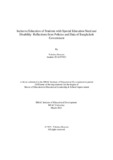Inclusive education of students with special education need and disability: reflections from policies and data of Bangladesh government

View/
Date
2021-03Publisher
Brac UniversityAuthor
Hossain, TahrimaMetadata
Show full item recordAbstract
With a prevalence of the population with a disability up to 14%, lack of inclusive education poses obstacles to equity in education for around 22 million people of Bangladesh. This research was undertaken to study the inclusive education of the students with Special Education Needs and Disability (SEND) at the primary level within Bangladesh. With that aim, this study explores the policies of Bangladesh and Education Household Survey, 2014 regarding inclusive education of the students with SEND. This study involved a parallel mixed-method approach. Both qualitative and quantitative data were gathered from the different secondary source. A content analysis of the policies in the qualitative part found that even though there is a complete range legislative setup for inclusive education for students with disability, none of the policies outlines any detailed strategies about how to achieve inclusive education for students with SEND. A regression analysis of the quantitative data revealed that the literacy rate of students with SEND is significantly low than other students. Based on the findings, this research recommends standard definition and language for inclusive education should be a high priority that will the first step to ensure the implementation of inclusive education. The next step after defining inclusive education and student with SEND should clearly outline the scope for implementing inclusive education. Then a detailed strategy will be needed as a next step that will include understanding the change by all actors, curriculum change, and school leaders and teachers. Strategies should also include the infrastructure change and support for students with SEND. After the implementation of the strategy, it should be monitored and supervised regularly.
